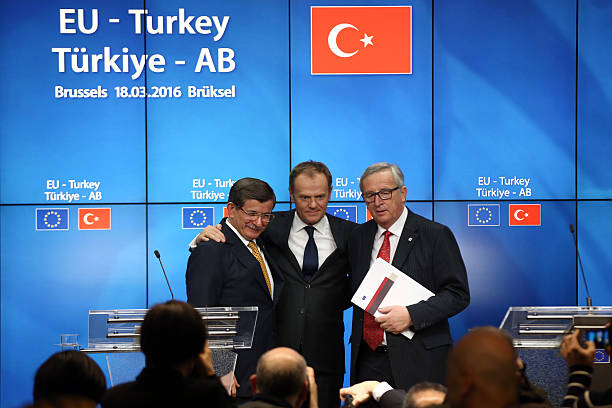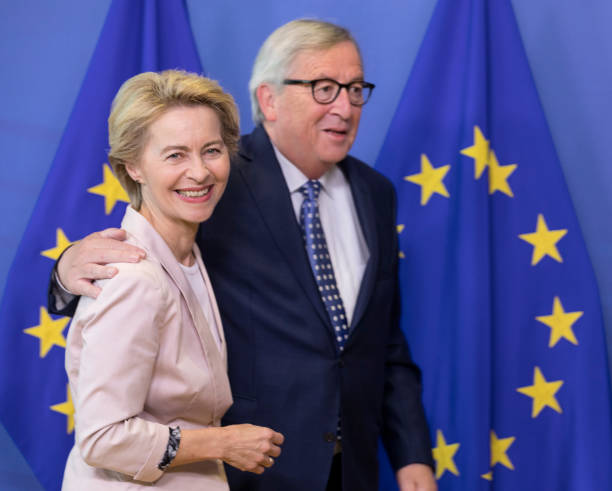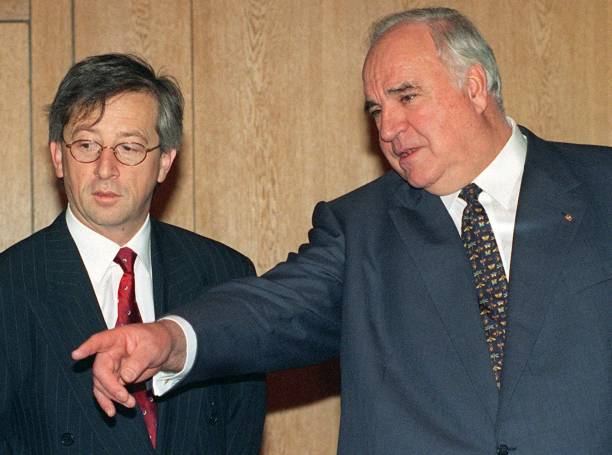Background
Jean-Claude Juncker was born on December 9, 1954 in Redange, Luxembourg. He is a son of Joseph Juncker and Marguerite Juncker. Juncker was primarily raised in the southern part of the country.


2019
Brussels, Belgium
President of the European Commission Jean-Claude Juncker, President of the European Council Donald Franciszek Tusk, Luxembourg Prime Minister Xavier Bettel during a celebration to mark the 25th anniversary of the European Economic Area on the second day of an European Union summit on March 22, 2019.
1995
Jean-Claude Juncker
1996
Dublin, Ireland
Luxembourg Prime Minister Jean-Claude Juncker, Dutch Prime Minister Wim Kok, and British Prime Minister John Major on December 14, 1996 at the beginning of a working session of the European Union summit in Dublin.
1997
Jean-Claude Juncker at work in his office
1997
Bonn, Germany
President-in-Office of the European Council and Luxembourg Prime Minister Jean-Claude Juncker talks to Federal Chancellor Helmut Kohl at the Chancellery in Bonn on December 9, 1997.
1998
Wildbad Kreuth, Kreuth, Germany
Prime Minister of Luxembourg Jean-Claude Juncker talks to the leader of the Christian Social Union in Bavaria on January 9, 1998.
2004
10 Downing St, Westminster, London SW1A 2AA, United Kingdom
Luxembourg's Prime Minister and Finance Minister Jean-Claude Juncker meets with Britain's Prime Minister Tony Blair on April 19, 2004.
2004
Brussels, Belgium
Jean-Claude Juncker, Prime Minister and Finance Minister of Luxembourg, arrives for the European Union finance ministers meeting on July 5, 2004.
2012
17 Rue du Marché-aux-Herbes, 1728 Luxembourg
Luxembourg Prime Minister Jean-Claude Juncker with wife attend the Gala dinner for the wedding of Prince Guillaume of Luxembourg and Stephanie de Lannoy at the Grand-ducal Palace on October 19, 2012.
2014
Brussels, Belgium
Jean-Claude Juncker with Ukrainian Prime Minister Arseniy Yatseniuk, during EPP summit, on March 20, 2014.
2016
Rue de la Loi 41, 1000 Bruxelles, Belgium
President of the European Commission Jean-Claude Juncker and British Prime Minister Theresa May at the end of a two-day summit at the Council of the European Union on October 21, 2016.
2016
Brussels, Belgium
President of the European Commission Jean-Claude Juncker, Turkey's Prime Minister Ahmet Davutoglu and President of the European Council Donald Tusk during a two-day European Union summit on March 18, 2016.
2017
Jean-Claude Juncker with German Chancellor Angela Merkel in June 2017.
2018
1600 Pennsylvania Avenue NW, Washington, DC 20500, United States
President of the European Commission Jean-Claude Juncker and United States President Donald Trump in the Oval Office at the White House on July 25, 2018.
2018
Rue de la Loi 41, 1000 Bruxelles, Belgium
President of the European Union Commission Jean-Claude Juncker and the 36th President of Chile Sebastian Pinera at the European Union Commission headquarters on October 12, 2018.
2018
Brussels, Belgium
President of European Commission Jean-Claude Juncker attends the Euro Summit on October 18, 2018.
2018
Brussels, Belgium
Jean-Claude Juncker with Ukrainian Prime Minister Volodymyr Groysman in May 2018.
2019
Rue de la Loi 41, 1000 Bruxelles, Belgium
President of the European Commission Jean-Claude Juncker and Nominee President of the European Union Commission Ursula von der Leyen at the Berlaymont, the European Commission headquarters, on July 4, 2019.
2019
Rue de la Loi 41, 1000 Bruxelles, Belgium
European Commission Jean-Claude Juncker and Leo Varadkar at the Berlaymont, the European Union Commission headquarters, on February 6, 2019.
2019
Luxembourg, Luxembourg, United Kingdom
European Commission President Jean-Claude Juncker and British Prime Minister Boris Johnson on September 16, 2019.
2019
55 Rue du Faubourg Saint-Honoré, 75008 Paris, France
European Union Commission President Jean-Claude Juncker and French President Emmanuel Macron at the Elysee Palace on May 10, 2019.
2019
55 Rue du Faubourg Saint-Honoré, 75008 Paris, France
European Commission President Jean-Claude Juncker, Chinese President Xi Jinping, French President Emmanuel Macron, and German Chancellor Angela Merkel at the Elysee Palace on March 26, 2019.
2019
Bâtiment Paul Henri Spaak, Rue Wiertz 60, 1047 Bruxelles, Belgium
President of the European Commission Jean-Claude Juncker delivers a speech during a session of the European Parliament on Brexit on January 30, 2019 in Brussels, Belgium.
2019
Rue de la Loi 175, 1000 Bruxelles, Belgium
European Commission President Jean-Claude Juncker attends a summit of European Union leaders on October 17, 2019.
2019
7 Place Adrien Zeller, Allée du Printemps B.P. 1024, 67070 Strasbourg, France
Jean-Claude Juncker, President of the European Commission, at the European Parliament in Strasbourg on April 17, 2019.
2019
Brussels, Belgium
President of the European Commission Jean-Claude Juncker, President of the European Council Donald Franciszek Tusk, Luxembourg Prime Minister Xavier Bettel during a celebration to mark the 25th anniversary of the European Economic Area on the second day of an European Union summit on March 22, 2019.
2019
Rue de la Loi 41, 1000 Bruxelles, Belgium
European Commission President Jean-Claude Juncker and European Council President Donald Tusk at the end of the first day of a two-day summit of European Union leaders on March 21, 2019.
30 Boulevard Pierre Dupong, 1430 Luxembourg
Lycée Michel Rodange where Jean-Claude Juncker received a Bachelor of Arts degree in 1974.
4 Rue Blaise Pascal, 67081 Strasbourg, France
The University of Strasbourg where Jean-Claude Juncker received a Master of Arts degree in 1979.
The Order of Arts and Letters that Jean-Claude Juncker received in 1985.
Grand Cross of the Order of Merit that Jean-Claude Juncker received in 1988.
Grand Cross of the Order of Prince Henry the Navigator that Jean-Claude Juncker received in 1988.
Grand Officer of the Legion of Honor that Jean-Claude Juncker received in 2002.
Grand Cross of the Order of the Star that Jean-Claude Juncker received in 2003.
Commander of the Order of Polonia Restituta that Jean-Claude Juncker received in 2004.
Grand Cross of the Order of Christ that Jean-Claude Juncker received in 2005.
Grand Cross of the Order of the Three Stars that Jean-Claude Juncker received in 2006.
Grand Cross of the Order of Isabella the Catholic that Jean-Claude Juncker received in 2007.
Grand Cross of the Order of Merit of the Italian Republic that Jean-Claude Juncker received in 2007.
Collar of the Order pro Merito Melitensi that Jean-Claude Juncker received in 2010.
Grand Decoration of Honour in Gold with Sash that Jean-Claude Juncker received in 2010.
Grand Cross of the Order of the Redeemer that Jean-Claude Juncker received in 2013.
Grand Cross of the Federal Order of Merit that Jean-Claude Juncker received in 2013.
The Order of Friendship that Jean-Claude Juncker received in 2014.
Grand Cross of the Royal Norwegian Order of Merit that Jean-Claude Juncker received in 2014.
The First Class of the Order of Prince Yaroslav the Wise that Jean-Claude Juncker received in 2019.
Companion with Star of the National Order of Merit that Jean-Claude Juncker received in 2019.
Grand Cross of the Order of Adolphe of Nassau that Jean-Claude Juncker was awarded.
The International Charlemagne Prize of Aachen that Jean-Claude Juncker was awarded in 2006.
The Order of Merit of Rhineland-Palatinate that Jean-Claude Juncker received in 2011.
Jean-Claude Juncker with wife and dog
Jean-Claude Juncker with wife
16-year-old Jean-Claude Juncker

















































Jean-Claude Juncker was born on December 9, 1954 in Redange, Luxembourg. He is a son of Joseph Juncker and Marguerite Juncker. Juncker was primarily raised in the southern part of the country.
Jean-Claude Juncker attended the Roman Catholic secondary school at Clairefontaine. Later he studied at Lycée Michel Rodange where he received a Bachelor of Arts degree in 1974. In 1975, Juncker entered the University Strasbourg and obtained a Master of Arts degree in Law 1979. In 1980 he was sworn into the Luxembourg Bar Council.
Jean-Claude Juncker has received honorary doctorates from many universities, including the University of Porto, the University of Athens, the University of Pittsburgh, and the University of Bologna.
Jean-Claude Juncker started his career as chairman at the Christian Social Youth in 1979. He held this post until 1985. He also served as Parliamentary Secretary of the Christian Social Party from 1979 to 1982. In 1982, Juncker received a government post after being named Secretary of Employment and Social Security. Two years later, he was elected to the legislature and was appointed Minister for Work and Employment on July 20, 1984. In 1989, he became governor of the World Bank and held this post until 1995. He left his post of Minister for Work and Employment on August 7, 1999. Juncker also served as Minister for Finances from 1989 to 2009.
Jean-Claude Juncker became chairman of the Christian Social People's Party in 1990. He assumed office as Prime Minister of Luxembourg on January 20, 1995. In 1999, he won the general election and became Prime Minister for a second term. On January 1, 2005, he became President of the Eurogroup. Juncker left the posts of Prime Minister of Luxembourg and Minister for the Treasury on December 4, 2013. The same year, he left the post of President of the Eurogroup. On November 1, 2014, Juncker took up the post of President of the European Commission and held this post until 2019.
Jean-Claude Juncker is a Luxembourgian politician, best-known as former President of the European Commission. He also served as the 23rd Prime Minister of Luxembourg, Minister for Finances, and Minister for the Treasury. Juncker is also known as the longest-serving head of any national government in the European Union.
Juncker has received several international honors, such as the Order of Arts and Letters, Grand Cross of the Order of Merit, Order of Polonia Restituta, Order of the Three Stars, Order of the Redeemer, and National Order of Merit. In 1998, Juncker received the Vision for Europe Award and in 2006 he was awarded the International Charlemagne Prize of Aachen. He also received the Order of Merit of Rhineland-Palatinate and the European of the Year prize.
Jean-Claude Juncker joined the Christian Social People's Party in 1974. As Prime Minister of Luxembourg, Jean-Claude Juncker became known for accelerating the country's economic performance, which helped Luxembourg reach one of the highest levels of GDP per capita in the world. He also made several official visits abroad to improve ties with other countries. On a visit to Dublin, he managed to mediate a dispute over the European Union Economic and Monetary Union policy between French President Jacques Chirac and German Chancellor Helmut Kohl. Juncker was dubbed "Hero of Dublin" by the media for achieving the unlikely consensus. Juncker advocated for social integration in Europe along with constituting the so-called "Luxembourg Process." He instigated the "Euro 11," an informal group of European finance ministers for matters regarding his Economic and Monetary Union ideals. Juncker also supported the 2011 military intervention in Libya.
When he became President of the Eurogroup he shaped the response to the sovereign debt crisis, which had led to the downfall of economies within the eurozone. As President of the European Commission Juncker supported the European Union–Mercosur free trade agreement. After a series of terrorist attacks in Europe, Juncker in 2016 called for the creation of a European Union security union. He also defended the Common Agricultural Policy, saying that agriculture employs about 30 million Europeans. Juncker is a strong advocate of a European "solidarity" union.
Jean-Claude Juncker faced accusations from Euroskeptic members of Parliament, who claimed that Juncker had orchestrated a tax-avoidance scheme involving hundreds of multinational companies during his tenure as Prime Minister of Luxembourg. With the aid of his government, companies used to transfer tax liability for billions of euros to Luxembourg, where income tax was levied at a rate lesser than 1%. Juncker, however, denied these claims. He also received much criticism because of his remarks on immigration. During the European Forum Alpbach, he said that borders are the worst invention made by politicians, supporting Angela Merkel's open-door stance to the European migrant crisis.
Quotations:
"I have a lot of understanding for people skeptical about the EU. Because there are legitimate questions to the address about the European Union, including the Commission. You have to answer that. You have to talk to the Eurosceptic people. By the way, sometimes I am myself, I am not free from Euroscepticism sometimes. But I am not on the way to fundamental opposition."
"Anyone who believes that the eternal question of war and peace in Europe is no longer there risks being deeply mistaken."
"My main concern is to protect people from detriment."
"It is not acceptable that European Union countries are divided into those who give and those who take."
"I am against nationalists, but I am very much in favour of patriots."
"Forgetting the importance of national landscapes, cultures, national behaviours, reactions, and reflexes is a big, big mistake."
"From the very beginning, Europe has been not only a success story but also a story of success achieved by learning."
Jean-Claude Juncker is a member of the Academy of Moral and Political Sciences of the Institute of France.
Jean-Claude Juncker is a workaholic and a persevering man. Those who know him said that there were days when Juncker worked 14 hours a day. He is also a heavy smoker.
Physical Characteristics: Juncker suffers from sciatica attacks following a 1989 car accident, which cause him occasional unsteadiness while walking.
Quotes from others about the person
George W. Bush: "I was going to say he's a piece of work, but that might not translate too well. Is that all right, if I call you a 'piece of work'?"
Jean-Claude Junker married Christiane Frising in 1979. The couple doesn't have any children.
